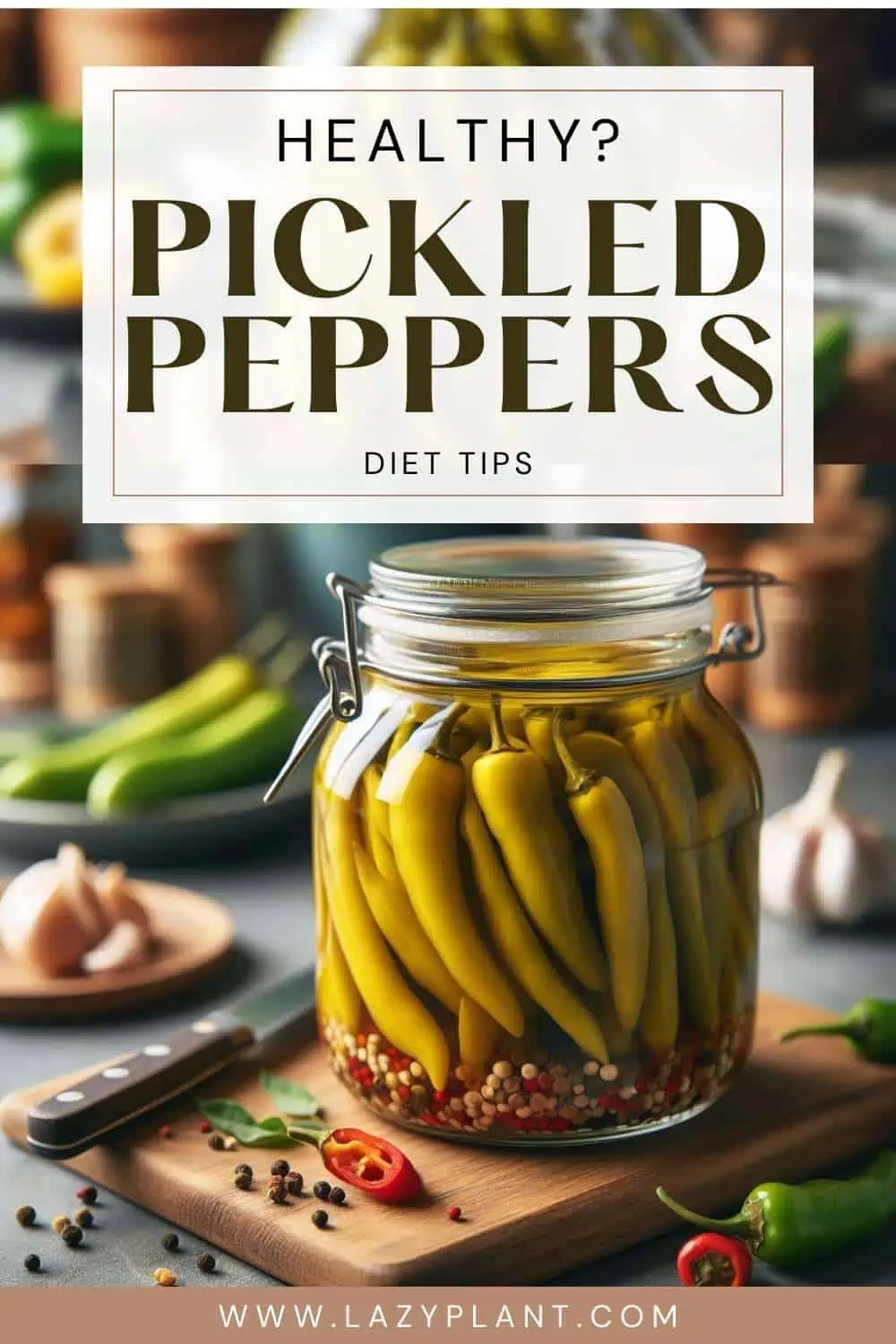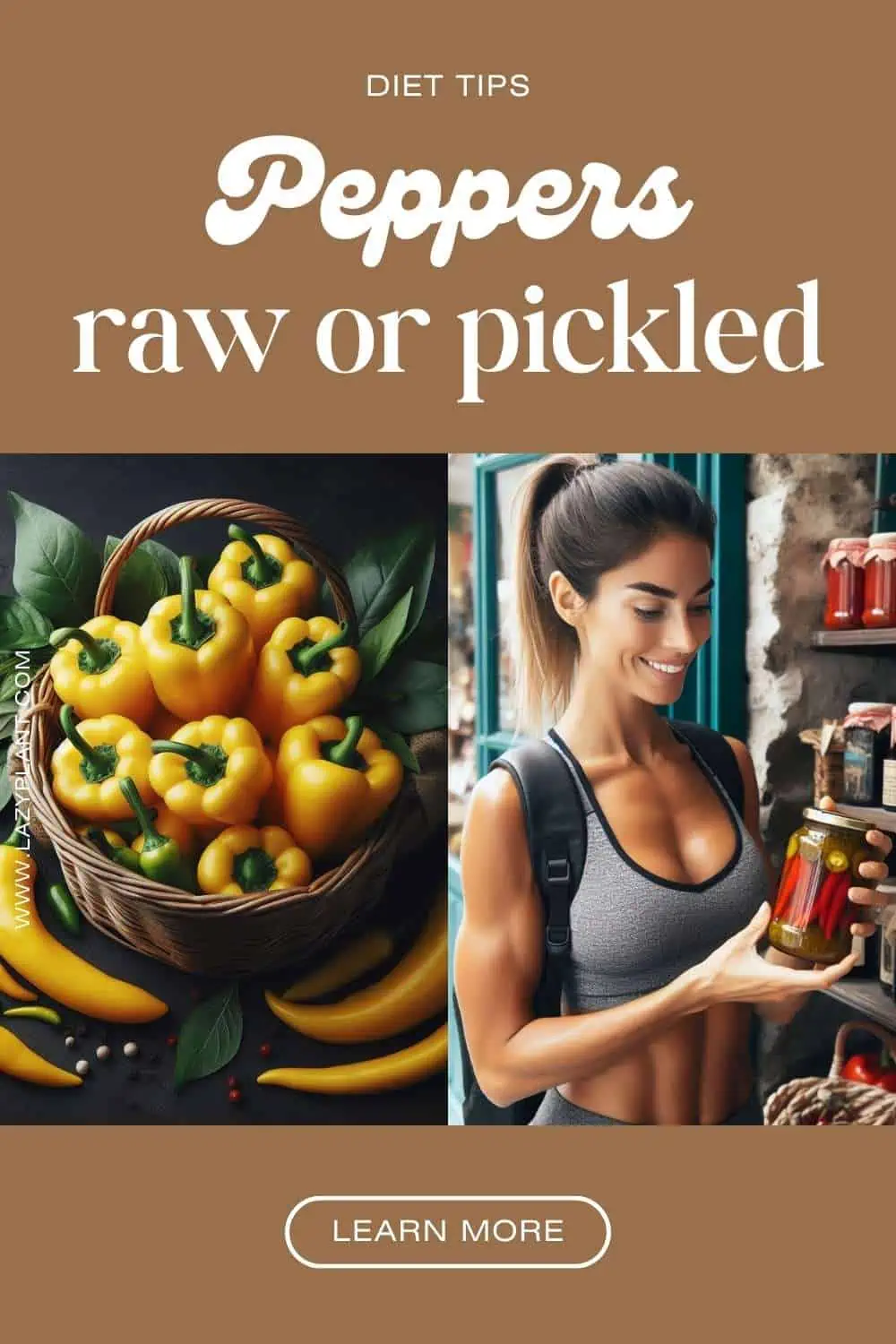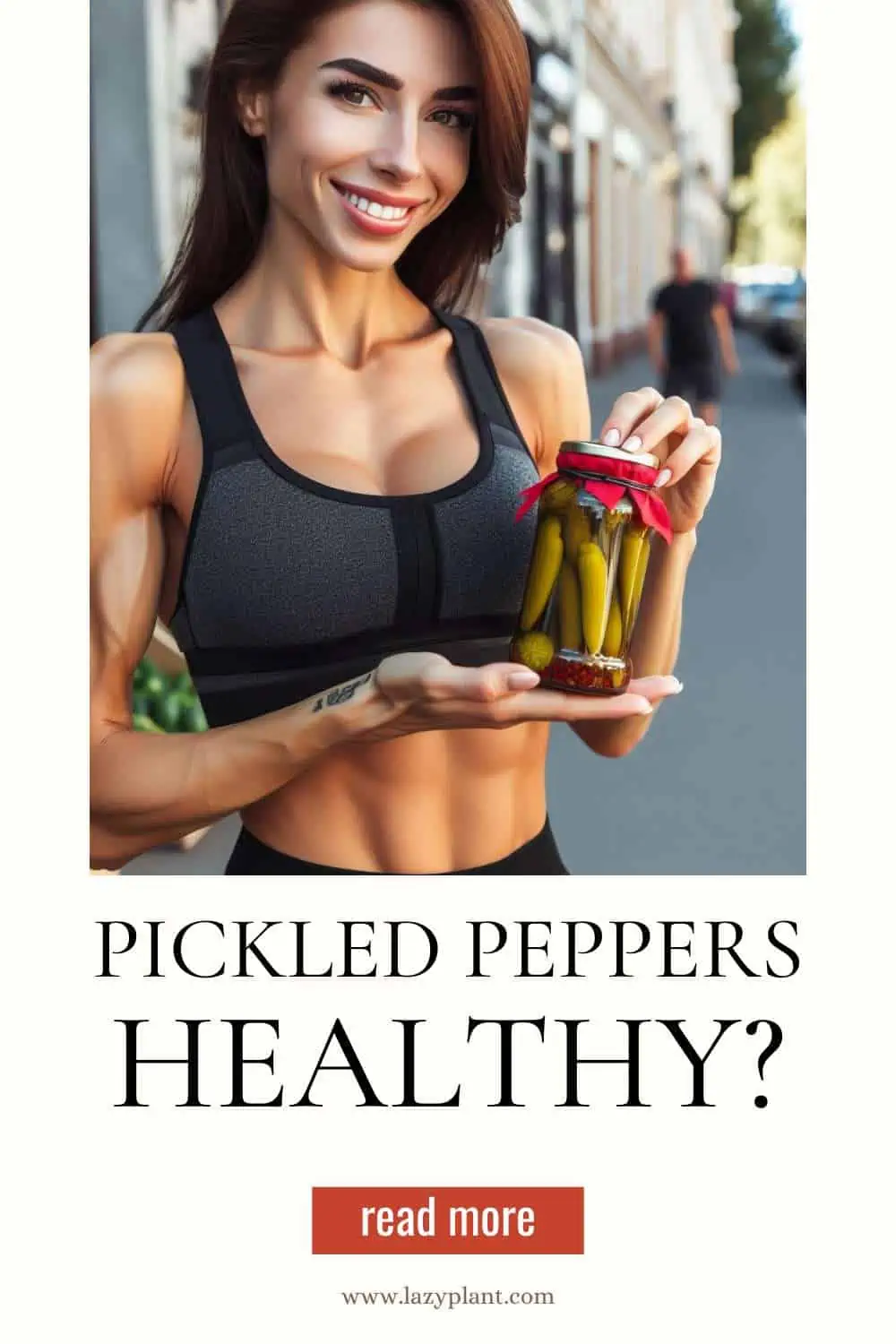Raw banana peppers are good for you, as they’re among the most nutrient-dense vegetables you can eat. They’re packed with fiber, vitamin C, and vitamin B6, providing huge health benefits with only a few calories!
On the contrary, better to avoid the regular consumption of pickled peppers. Due to their high sodium content and the abundance of vitamins, pickled peppers aren’t a healthy food option. You could only use them to add flavor to dishes.
Raw banana peppers are good for you
Raw banana peppers have many health benefits, as they’re packed with vitamins, antioxidants, and fiber.
For instance, 2 medium banana peppers contain:
- Vitamin C: 110% of the Daily Value (DV)
- Vitamin B6: 27% DV
- Potassium: 10% DV
- Copper: 10% DV
- Niacin: 9% DV
- Vitamin E: 5% DV
Vitamin C
Above all, they’re particularly rich in vitamin C. Actually, banana peppers are among the richest foods in vitamin C. In fact, they have more vitamin C than oranges.
There are many types of pepper. Almost all of them are rich in vitamin C. Bell peppers are among the richest varieties of vitamin C, containing 100-140 mg of vitamin C per 100g.
| Variety | Vitamin C (mg/100g) |
| ancho pepper, dried | 2 |
| banana pepper | 83 |
| bell pepper, green | 100 |
| bell pepper, red or yellow | 140 |
| cayenne pepper | 76 |
| chili pepper, dried | 31 |
| chili pepper, green, raw | 242 |
| chili pepper, red, raw | 144 |
| Hungarian pepper | 93 |
| jalapeño pepper | 119 |
| pasilla pepper, dried | 6 |
| pickled pepper | 12-77 |
| poblano pepper | 80 |
| serrano pepper | 45 |
Green chili peppers are the richest peppers in vitamin C. But, we can’t eat 100 grams of raw chili pepper.
Consuming any sweet bell pepper can skyrocket the daily vitamin C intake! A large yellow/red pepper has about 280 mg of vitamin C or 310% of the DV while a green pepper has about 200 mg of vitamin C or 220% of the DV.
As vitamin C is pretty vulnerable to heat, try to eat raw peppers in salads or sandwiches. Cooked, pickled, jarred, canned, or sun-dried peppers have significantly less vitamin C.
Health benefits of Vitamin C
Vitamin C is a powerful antioxidant that plays a crucial role in supporting the immune system and enhancing the body’s ability to fight infections and illnesses.
Also, it’s essential for the synthesis of collagen, a protein important for skin, blood vessels, bones, and other connective tissues.

Moreover, vitamin C promotes the healing of wounds, assists in the repair and maintenance of tissues, supports cardiovascular health by improving blood vessel function and reducing the risk of heart diseases, enhances the absorption of non-heme iron from plant-based foods, has potent anti-inflammatory properties, may reduce the risk of age-related macular degeneration (AMD) and has many more health benefits.
Hence, eating foods like banana peppers which are rich in this vitamin is crucial for good health. Keep in mind that we have to consume such foods every day. Vitamin C is a water-soluble vitamin. The body doesn’t store high amounts.
Vitamin B6
With 27% of vitamin B6 per serving, banana peppers are great natural sources of vitamin B6.
Vitamin B6 is essential for the metabolism of carbohydrates, proteins, and fats, converting food into energy.
Also, it plays a crucial role in the synthesis of neurotransmitters like serotonin and dopamine, substantially affecting mood.
In addition, vitamin B6 supports the immune system, helps regulate hormone activity and is involved in the synthesis of steroid hormones such as estrogen and testosterone.
Low in Calories
Moreover, banana peppers are a healthy, nutrient-dense food, as they’re low in calories. A raw banana pepper has only 9–20 calories, depending on its size.
Support a Fiber-rich diet
Also, banana peppers are good sources of fiber. Actually, banana peppers are the richest pepper variety in fiber!
They contain 3.4 grams of fiber per 100g. A banana pepper contains up to 2.55 grams of fiber. This dose is 9% of the recommended daily intake!
Consuming adequate amounts of fiber may decrease the risk of developing heart disease, stroke, hypertension, diabetes, obesity, high blood pressure and cholesterol.
Hydrate the body
Furthermore, banana peppers hydrate the body as they’re 92% water.
Eating healthy plant-based foods high in water hydrates the body better than tap water. Firstly, fruits and vegetables are natural water filters, providing high-quality, purified water.
Moreover, banana peppers are rich in electrolytes. Daily replenishment of lost electrolytes is also necessary for good health.
Adequate hydration supports the proper functioning of organs, including the heart, kidneys, and liver. Also, it’s essential for maintaining mental clarity, concentration, and overall cognitive function.
In addition, proper hydration ensures adequate lubrication of joints, reducing the risk of joint pain or stiffness and aids in the digestion and absorption of nutrients, preventing constipation and promoting a healthy digestive system.
Don’t forget that hydration contributes to skin elasticity, preventing dryness, and supporting a healthy complexion. It’s important for weight management as well, as it helps control appetite and burn belly fat.
Regulate Glycemic responses
Banana peppers can regulate the postprandial glycemic response. Water, fiber, vitamin C, and other antioxidant compounds in banana peppers controls blood glucose levels. They have a low GLycemic Index.
So, you could add them to recipes with foods high in carbs.
Actually, banana peppers are keto-friendly. They’re low in net carbs. Even people with diabetes can regularly consume them.

Which pepper variety has more health benefits?
There are many pepper varieties. Not only do they have different flavors, but they also have different nutritional value and health benefits.
It is difficult to tell the differences between banana peppers and pepperoncini, which are two of the most common pepper varieties.
When pickled, banana peppers are easily confused with pepperoncini peppers. Prefer fresh banana peppers to pepperoncini peppers. They have more health benefits, as they have a greater nutritional value!
Actually, only pickled pepperoncini peppers are sold. They’re usually found pickled in jars.
Are pickled banana peppers good for you?
Pickled peppers have a poor nutritional value and may be bad for your health. Better avoid them.
First, pickled pepperoncini peppers contain no vitamin C.
Most noteworthy, all pickled vegetables are high in sodium. For instance, pickled pepperoncini in a jar may contain more than 1,500 mg of sodium per 100g. The Dietary Guidelines for Americans recommends limiting sodium intake to less than 2,300 mg per day.
Actually, the regular consumption of pickled peppers can make us gain weight and increase Body Mass Index and systolic and diastolic blood pressure.
Scientists found a significant association between the consumption of pickled vegetables and obesity. Pickled vegetables may manipulate our hormones, making us consume more calories.
Also, a high intake of pickled vegetables may increase the risk of gastric and colorectal cancer. On the contrary, we should eat more fresh vegetables like banana peppers in order to reduce the risk of gastric cancer.
A 2010 study showed that vegetable consumption is important for a decreased risk of breast cancer.
According to another study, published in the British Journal of Cancer, high consumption of pickled vegetables may increase two-fold the risk of esophageal cancer.
What type of pickled vegetables should I prefer?
If you enjoy pickled vegetables once in a while, at least try to buy pickled vegetables which:
- are low in sodium. We need sodium, but just a little. Most pickled vegetables will skyrocket your daily sodium intake. Prefer brands with the minimum sodium content.
- contain vinegar. Vinegar has many health benefits. For instance, vinegar helps the body control blood sugar levels.
- are fermented. Fermented foods naturally contain probiotics. These are good for gut microbiota. Probiotics keep your digestive system healthy.
Add only small portion sizes to provide flavor to healthy dishes. Avoid consuming high amounts.
Which are healthier? Fresh or pickled banana peppers?
Both raw and pickled banana peppers can be part of a healthy diet. If you’re focused on maximizing the natural nutritional content and minimizing added sodium, raw peppers might be the preferred choice.
However, if you enjoy the unique taste of pickled peppers, you can still include them in moderation as part of a balanced diet.
How many pickled banana peppers can I eat a day?
Healthy people can eat fresh banana peppers daily. There isn’t an upper recommended daily intake. Actually, they’re among the healthiest foods you can regularly enjoy.
On the contrary, you better avoid consuming pickled banana peppers every day. It’s an unhealthy eating habit. Use them to add flavor and make healthy, but “boring” foods more appealing.
As a general guideline, moderation is key. Healthy people can enjoy pickled banana peppers as part of a well-balanced diet without overdoing it.
If you have specific dietary concerns or health conditions, it’s advisable to consult with a healthcare professional or a registered dietitian for personalized guidance.

How to eat banana peppers?
Healthy recipe ideas
You can add raw banana peppers to many healthy dishes. They add flavor to toasts, sandwiches, salads, pizza, and countless other meals or snacks. Here are 12 easy, quick, and healthy food recipe ideas to incorporate banana peppers into your diet:
- Banana pepper hummus: Blend banana peppers into your favorite hummus recipe for a spicy kick.
- Stuffed banana peppers: Fill banana peppers with a mixture of lean ground turkey, quinoa, tomatoes, and spices.
- Banana pepper salsa: Combine diced banana peppers, tomatoes, onions, cilantro, and lime juice for a refreshing salsa.
- Banana pepper pizza: Top your pizza with banana pepper rings for a zesty twist.
- Grilled banana pepper chicken: Marinate chicken breasts with banana peppers, olive oil, and herbs, then grill to perfection.
- Banana pepper stir-fry: Add banana peppers to a vegetable stir-fry with tofu or your choice of protein.
- Banana pepper guacamole: Mix diced banana peppers into guacamole for an extra flavor boost.
- Banana pepper and feta salad: Combine banana peppers, cherry tomatoes, cucumber, and feta cheese in a refreshing salad.
- Banana pepper pesto pasta: Blend banana peppers into a traditional pesto sauce and toss with pasta.
- Banana pepper omelette: Add sautéed banana peppers to your morning omelette for an extra kick.
- Banana pepper turkey wrap: Wrap lean turkey, banana peppers, lettuce, and your favorite condiments in a whole-grain tortilla.
- Banana pepper and avocado toast: Top whole-grain toast with mashed avocado and sliced banana peppers.
Recipe Ideas to incorporate small amounts of pickled peppers
Here are 12 healthy recipes using pickled banana peppers with low sodium doses for flavor:
- Pickled banana pepper hummus: Blend pickled banana peppers into hummus for a tangy and spicy kick.
- Pickled banana pepper and avocado Wrap: Spread mashed avocado on a whole-grain wrap and add pickled banana peppers for a zesty twist.
- Pickled banana pepper Greek yogurt dip: Mix pickled banana peppers into Greek yogurt for a low-sodium spicy dip.
- Pickled banana pepper and turkey lettuce wrap: Use pickled banana peppers as a topping for turkey lettuce wraps for added flavor.
- Pickled banana pepper and chickpea salad: Combine pickled banana peppers with chickpeas, red onion, and parsley for a refreshing salad.
- Pickled banana pepper and egg breakfast sandwich: Add pickled banana peppers to a breakfast sandwich with whole-grain bread and a poached egg.
- Baked sweet potato with pickled banana peppers: Top a baked sweet potato with pickled banana peppers for a simple and flavorful side dish.
- Pickled banana pepper and tuna salad: Mix pickled banana peppers into a tuna salad with light mayo, celery, and green onions.
- Pickled banana pepper pizza: Sprinkle pickled banana pepper rings on your pizza for a burst of flavor with minimal sodium.
- Pickled banana pepper cucumber rolls: Roll cucumber slices with cream cheese and pickled banana peppers for a low-sodium appetizer.
Remember to drain excess liquid from the pickled banana peppers to reduce sodium intake.
Sources:
- NIH-National Institutes of Health: Office of Dietary Supplements
- National Center for Biotechnology Information (NCBI): Fresh and pickled vegetable consumption and gastric cancer in Japanese and Korean populations: a meta-analysis of observational studies.
- NCBI-National Center for Biotechnology Information: Pickle Consumption is Associated with Body Mass Index and Blood Pressure among Iranian Female College Students: a Cross-Sectional Study (pdf)
- NCBI-Vegetables, but not pickled vegetables, are negatively associated with the risk of breast cancer.
- British Journal of Cancer: Pickled vegetables and the risk of oesophageal cancer: a meta-analysis
- Pubmed: Intake of Pickled Vegetables and Colorectal Cancer
- Academy of Nutrition and Diabetics: Dietary fat increases vitamin D-3 absorption.